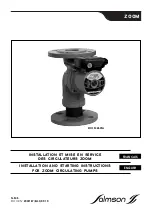
7
• Is the
THERMAL
indicator lit red on the
rear panel? Make sure there is at least six
inches of free space behind the SA1521.
Poor bass performance
• Check the polarity of the connections
between the mixer and the loudspeak-
ers. You may have your positive and
negative connections reversed at one
end of one cable, causing one loud-
speaker to be out-of-phase.
Poor sound
• Is it loud and distorted? Make sure that
you’re not overdriving a stage in the
signal chain. Verify that all level controls
are set properly.
• Is the input connector plugged com-
pletely into the jack? Be sure all
connections are secure. It’s a good idea
to periodically clean all electrical
connections with a non-lubricating
electrical contact cleaner.
Noise
• Make sure all connections to the active
loudspeakers are good and sound.
• Make sure none of the signal cables are
routed near AC cables, power trans-
formers, or other EMI-inducing devices.
• Is there a light dimmer or other SCR-
based device on the same AC circuit as
the SA1521? Use an AC line filter or
plug the SA1521 into a different AC
circuit.
Hum
• Try disconnecting the cable connected
to the
MAIN INPUT
jack. If the noise
disappears, it could be a “ground loop,”
rather than a problem with the SA1521.
Try some of the following troubleshooting
ideas:
• Use balanced connections throughout
your system for the best noise rejection.
• Whenever possible, plug all the audio
equipment’s linecords into outlets which
share a common ground. The distance
between the outlets and the common
ground should be as short as possible.
SERVICE INFORMATION
Warranty Service
If you think your loudspeaker has a
problem, please do everything you can to
confirm it before calling for service, includ-
ing reading through the following
Troubleshooting section. Doing so might
save you from being deprived of your
Mackie loudspeaker.
Of all Mackie products returned for ser-
vice (which is hardly any at all), many are
coded “CND” — Could Not Duplicate—
which usually means the problem lay some-
where else in the system. The following
troubleshooting tips may sound obvious,
but here are some things you can check:
Troubleshooting
No power
• Our favorite question: Is it plugged in?
Make sure the AC outlet is live (check
with a tester or lamp).
• Our next favorite question: Is the
POWER switch on? If not, try turning
it on.
• Is the POWER LED on the rear panel
glowing green? If not, make sure the AC
outlet is live. If so, refer to “No sound”
below.
• The internal AC line fuse may be blown.
This is not a user serviceable part. If you
suspect the AC line fuse is blown, please
see the REPAIR section next.
No sound
• Is the input LEVEL control for the
input source turned all the way down?
Verify that all the volume controls in the
system are properly adjusted.
• Is the signal source working (and making
union scale)? Make sure the connecting
cables are in good repair and securely
connected at both ends. Make sure the
output volume (gain) control on the
mixing console is turned up sufficiently
to drive the inputs of the speaker.
• Make sure the mixer does not have a
Mute on or a Processor loop engaged. If
you find something like this, make sure
the volume/gain is turned down before
disengaging the offending switch.






























